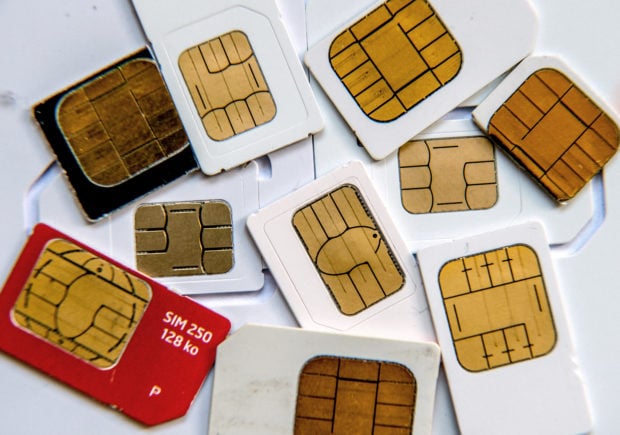‘Legality, feasibility’: NTC to review partial and gradual withdrawal of unregistered SIM cards

File photo /AFP
MANILA, Philippines — The “legal and technical feasibility” of gradually deactivating telecommunication services for unregistered SIM users is under review by The National Telecommunications Commission (NTC), according to its deputy commissioner.
“We’re closely coordinating that with the telcos and studying thoroughly if that is legally and technically feasible, and if we have enough time to implement it if [or] when it is found to be legally and technically feasible,” said NTC Deputy Commissioner Jon Paulo Salvahan in a Wednesday interview with The Source.
Department of Information and Communications Technology secretary Ivan Uy announced in a Tuesday press briefing that partial, gradual loss of telco services may be enforced to incentivize SIM registration.
The NTC aims to release a final study or “at least a resolution” on legal and technical workability of such an incentive within the next week.
Constitutionality, legality
Salvahan established that while the SIM Registration Act’s current rules for implementation mandate automatic SIM deactivation after the registration deadline, the law itself is “silent” on the legality of partial deactivation within the registration period.
“The law expressly says that the automatic deactivation will happen if you fail to register within the deadline. The law is silent on whether or not you can partially deactivate some of the services within the period of registration,” said the deputy commissioner.
However, the NTC deferred its right to comment on the constitutionality of gradual telco service withdrawal, opting to wait for a copy of the petition against the SIM Registration Act that was junked by the Supreme Court on Tuesday.
According to Salvahan, the commission has yet to receive an official notice from the higher court on the temporary restraining order (TRO) plea.
“Well the constitutionality, I think there’s nothing naman that impinges on any of the rights. But we defer the right to comment on that because, as I understand, there’s a pending petition filed before the SC which the NTC has not officially yet received a copy of,” stated Salvahan.
The Supreme Court rejected the TRO bid led by journalists, press freedom activists, and data privacy advocates on Tuesday.
READ: SC junks plea to stop implementation of SIM Registration Act
Telcos bear brunt of partial deactivation
Salvahan also explained that the technical feasibility of such an incentive rests on the country’s telecommunications entities, as they would bear the responsibility of partially deactivating these services.
“It is the telcos themselves which will, sort of, whitelist these apps or the social media services for the unregistered subscribers,” he said.
“We’re continuously discussing that. We’ve asked the telcos for their comments on the legal and technical feasibility of these proposals,” Salvahan added.
Partial deactivation of social media accounts has never been implemented in the Philippines, but has been tried in other countries, according to the NTC deputy commissioner.
“I think in other countries, it’s been done where they deactivate certain social media services. I’m not sure if it’s for a particular class of individual, or if it’s a general implementation,” stated Salvahan.
Rights groups slam limitation of services
IT professionals’ organization Computer Professionals’ Union (CPU) and digitial advocacy group Digital Pinoys have voiced their condemnation of the possible telco service withdrawals.
“Effectively, the DICT is threatening Filipinos to give up their personal information or else be exempted from access to telecommunications services,” said CPU in a statement posted on Twitter.
https://twitter.com/cpu_ph/
“Recent public declarations by government agencies and officials have exposed the anti-people nature of SIM Registration, and that its true objective is not to quash scams, but to collect people’s personal info, leaving it open to be used for scams, surveillance, and harassment,” it added.
Digital Pinoys argued that limiting the social media communications access for unregistered SIM users is not part of the law itself, and should therefore be barred.
“The DICT head should stop inventing procedures that are not helpful and not part of the law or its IRR. Limiting social media access for subscribers with unregistered SIMs is not mentioned in any provision of the SIM registration law and should be off the table,” said Digital Pinoys national campaigner, Ronald Gustilo, in a press statement on Wednesday.
Gustilo also addressed DICT Secretary Uy, calling on the department to “recognize the actual situation on the ground.”
“With more than 90 million unregistered subscribers, it is clearly not a case of delaying up to the last minute, but more because of the inability of the DICT to plan and implement efficiently,” stated Gustilo.
RELATED STORIES
DICT: Low SIM registration turnout not due to lack of gov’t IDs
NTC: 90-day extension for SIM registration final; no further extensions
JMS
Disclaimer: The comments uploaded on this site do not necessarily represent or reflect the views of management and owner of Cebudailynews. We reserve the right to exclude comments that we deem to be inconsistent with our editorial standards.
